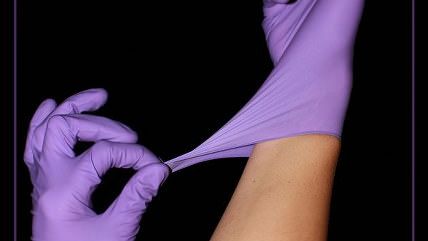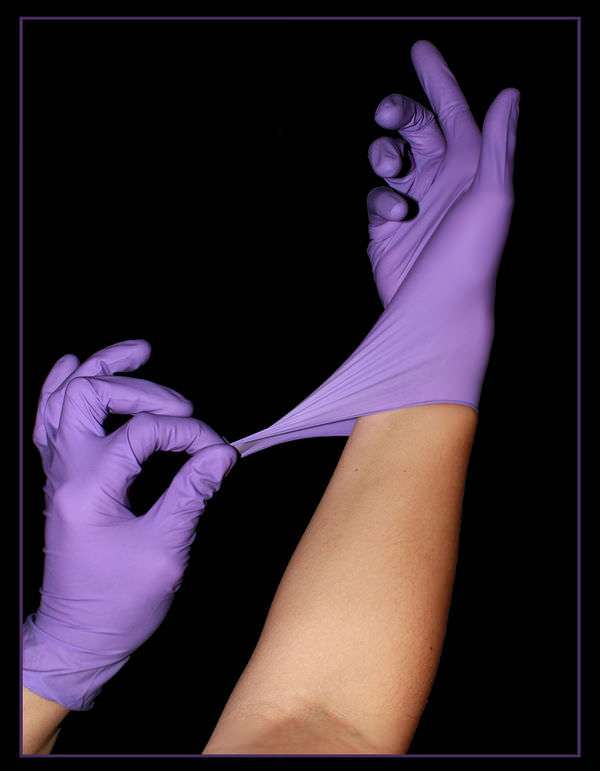California Chefs, Bartenders Now Forced To Wear Gloves
A new law prevents food professionals from touching what they serve to customers. Can a loophole help them skirt the rules?


Chefs and bartenders in California are aghast over a new law that prevents them from touching the food they will serve to customers. The new law, which took effect on January 1, is part of the California Retail Food Code.
State food handling regulations previously required foodservice employees to "minimize bare hand and arm contact with non-prepackaged food that is in a ready-to-eat-form[.]"
The new law "instead requires food employees to minimize bard (sic) hand and arm contact with exposed food that is not in a ready-to-eat form." The "ready-to-eat" terminology means "food that is edible without additional preparation to achieve food safety."
That sounds complex.
"Every California lawmaker who voted for this should be asked to cook food this way at home," says Walter Olson of Overlawyered and the Cato Institute, by email.
So which California lawmakers voted for this law? All of them, it turns out.
While the law has been wildly controversial since coming into force, it passed both the state senate and state assembly by unanimous votes.
Why this unanimous support for the law?
One reason, I suspect, is that there is data to support the claim that restaurant food preparation can—and sometimes does—make people sick (even if it's but one of many risk factors for foodborne illness).
According to CDC data, for example, nearly half of all cases of foodborne illness in 2009-10 "were caused by food consumed in a restaurant or deli." And a California Restaurant Association fact sheet notes that "food service employees are the source of contamination in more than two-thirds of the foodborne outbreaks reported in the United States with a bacterial or viral cause." But rather than suggesting chefs wear mittens while handling food, for example, the CDC instead urges every restaurant to "[t]rain and certify managers in food safety[.]"
The CDC also suggests other preventative steps.
"Illnesses can be greatly reduced," Dr. Patricia Griffin of the CDC told the Wall St. Journal last year, "if food preparers take simple precautions such as washing their hands often and keeping raw meat separate from fruits and vegetables."
So what can chefs and bartenders in California do to deal the glove requirement?
Thankfully, there is a loophole. It allows "food employees not serving a highly susceptible population to contact exposed, ready-to-eat food with their bare hands if specified requirements are met[.]"
Who is this "highly susceptible population"? The law defines it as "a group of persons who are more likely than other people in the general population to experience foodborne disease because both… [t]he group is comprised of immunocompromised persons, preschool age children, or older adults; [and that] group obtains food at a facility, including, but not limited to, a kidney dialysis center, hospital, nursing home, or senior center, that provides services, such as custodial care, health care, assisted living, or socialization services."
If it appears to you that the exception pretty much swallows the rule, then you're absolutely right. How many bartenders are zesting lemons for custom cocktails destined for "preschool age children" at, say, a kidney dialysis center, right?
So if the law isn't worth the paper it's printed on, then why are chefs and bartenders up in arms? It's the confusion it causes. And the paperwork required to avoid it.
In order to qualify for a "highly susceptible population" exemption, the law states that restaurants and bars must "obtain prior approval from the regulatory authority;" must maintain "[w]ritten procedures" on site "that include a list of the specific ready-to-eat foods that are touched by bare hands," and must present "diagrams and other information[.]" And that's not even the half of it. (The multi-step compliance language runs more than 400 words.)
And then there's the fact that "it's not clear how the Los Angeles County health department will enforce the new regulations or how it would allot exemptions," reports the Los Angeles Times.
"In pursuit of the mirage of perfect safety, this rule sacrifices craft, proportion and common sense," says Olson. "Even though laws like this often go ignored in practice, they open up every ungloved bartender and sushi chef to selective enforcement or an inspector's shakedown."
"This bill bothers me for many reasons. For the aesthetic crime of not letting cooks touch their food (which I firmly believe makes good food almost impossible to make), for the environmental impact of using millions of gloves each day, and most importantly, that studies show glove use actually increases overall bacteria, which makes more people sick," says Iso Rabins of the handmade food community ForageSF—who knows a thing or two about overly burdensome food safety rules—in an email to me this week. "It just doesn't make sense."


Show Comments (77)